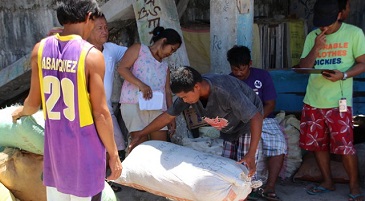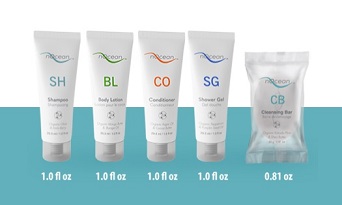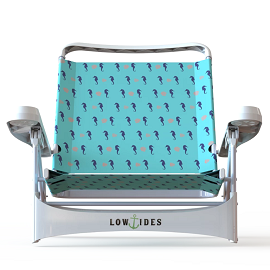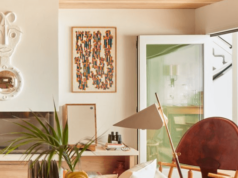
NATIONAL REPORT— Antonio de la Rosa just completed a 2,951-mile paddleboard journey from San Francisco to Oahu, Hawaii. One thing he saw every day during his trip was plastic nets and other plastic debris. He hoped his trip would bring attention to the problem of plastic pollution in the ocean. Attention to the problem is needed. It is estimated that a garbage truck load of plastic is dumped into the ocean every minute. Getting that plastic out of the ocean is no small task. One way to do that is to create a demand for ocean plastic or plastic bound for the ocean. Numerous companies are supplying the hospitality industry with products made from such plastic. Below are four examples.
Net-Works is an innovative, cross-segment initiative designed to tackle the growing environmental problem of discarded fishing nets in some of the world’s poorest coastal communities. At the same time, it supports Interface’s Mission Zero goal to source 100 percent recycled material for its carpet tile and also aligns with the Live Zero pillar of the company’s larger Climate Take Back initiative.
Interface has partnered with the Zoological Society of London to buy discarded fishing nets from some of the poorest communities in the world. The nets are recycled into new yarn for its carpet tiles by Aquafil. The benefits? Fewer ghost nets, less virgin materials and a new source of income for the communities. The partnership has created an inclusive business model with positive outcomes for everyone involved. The program started in the Philippines and was expanded to Cameroon in 2015. Expansion to Indonesia is currently underway.
More than 224 metric tons of fishing nets have been collected and recycled so far. Also, through Net-Works, 2,200 families have access to financing through the program’s community banks.
Amenities Container Alternative

A little more than a year ago, Nurture Hospitality Group (NHG), a U.S. based amenities company, launched with a strong social WE CARE message. Unique to the company, and a world first, is its reuse of ocean bound plastics as 60 percent of the composition of its 1 oz. and 2 oz. guest bathroom amenity plastic containers and caps.
“With an estimated 315 billion tons of plastics in the oceans today and growing at a shocking rate of 8 million tons per annum, NHG made a conscious decision that having our plastics manufactured from collected, and then processed ocean plastics, was the foundation on which we would build our company and manufacture our liquid containers,” said Adrian Lopez, NHG President, at the time of the company’s launch.
“Scientists are projecting if we don’t stop the flow of plastics into our oceans there could be more plastic in the oceans by weight than fish by 2050,” Lopez said. “Fish ingest these plastic particles and they find their way on to our dinner plates and into our bodies and those of our children.”
Plastics Collection Creates Jobs
NHG is utilizing plastics collected from the beaches and waterways of several less fortunate communities in Haiti and Yucatan Peninsula, Mexico. “We are stopping plastic from going into the ocean one tube at a time,” says NHG’s Lopez. “We are also creating income for these communities.”
The collected bottles are cleansed and reprocessed into new resins that are then made into high-quality tubes, bottles, caps and tubes carrying the nOcean, blends, and re|vere brands. NHG also licenses a fourth brand, Arquiste which is an ultra-luxury retail fragrance brand. The bottles and tubes are then filled with premium quality liquids containing many natural, and a minimum of two organic ingredients from communities in all six continents.
“Not only do these products keep plastic from entering our oceans, but by using ocean bound plastics, this also reduces the amount of non-renewable fossil fuels taken from the earth to produce plastics,” Lopez adds.
Lopez says interest so far has been “off the wall” and “very, very, positive.” “Our customers are loving the story,” he says. “We are helping impoverished communities and they are in turn are helping NHG and our partners create a paradigm shift in hospitality portion size bottles and tubes.”
“The Nonatum Resort is proud to be a good steward of our beautiful coastal environment in Maine,” says Tina Hewett-Gordon, General Manager. “nOcean aligns perfectly with this commitment to the environment by using recycled and repurposed beach collected plastic. It’s important to us to work with vendors like NHG that share our values, plus our guests love the light refreshing scent and feel of the products.”
NHG is a 110 percent carbon neutral company—in other words, carbon negative.
NHG’s North American parent company, Jypesa Hospitality, which has been an established amenity manufacturer for over 40 years, is moving toward the same business model as NHG.
Beach Chairs from Ocean Bound Plastic
LowTides Ocean Products creates Beach Chairs from upcycled ocean bound plastic. Each chair includes 2.5 pounds of the plastic. The towel bar, side arms and chair base are all made from the plastic that was collected from two key At-Risk Zones—the Yucatan Peninsula and Haiti. LowTides works with qualified partners directly at the source to ensure the ocean bound plastic is 100 percent traceable.

“Ocean bound plastic is different from other recycled plastic because our supply chain sources from target areas around the globe called At-Risk Zones,” the company says. “These places, unfortunately, lack professional collection efforts to recycle and as a result there is a high likelihood that the plastic will enter landfills, the environment and even our oceans.”
Brenton Hutchinson, CEO and Founder of LowTides Ocean Products, says he was inspired to launch the company while reading an article in National Geographic about ocean plastic. Nearly a year and a half later his company is selling pre-orders for beach chairs that are on track to be in by March 2020.
The chairs come in three sizes: Sandbar Low Chair, Dune Tall Chair, and Gully Kid Chair. What Hutchinson calls the “beach chair for a new generation” comes in fabrics with ocean themes such as starfish, sea horses and sharks. “I was tired of the stripes and the solids,” he says.
From Plastic Bottles to Uniforms
Last year, the Majorca-based hotel chain Iberostar Hotels & Resorts began replacing its traditional polyester uniforms with an alternative material made entirely from recycled plastic. Following exhaustive tests and trials, the new fabrics scored high on durability and comfort, and have been gradually introduced into the company’s complete portfolio of more than 120 hotels.
 The new uniforms have kept the iconic design created exclusively by Davidelfin for Iberostar Hotels & Resorts but are more sustainable thanks to the use of a fabric developed from recycled plastic bottles. With this initiative, the company is contributing to the removal of around 470,000 bottles from the oceans and landfills and will reduce its use of the more contaminating traditional polyester by more than 90,000 feet.
The new uniforms have kept the iconic design created exclusively by Davidelfin for Iberostar Hotels & Resorts but are more sustainable thanks to the use of a fabric developed from recycled plastic bottles. With this initiative, the company is contributing to the removal of around 470,000 bottles from the oceans and landfills and will reduce its use of the more contaminating traditional polyester by more than 90,000 feet.
Recycled polyester is a fabric made from plastics collected from both land and sea. Iberostar’s new uniforms, which were tested and introduced at the Iberostar Paseo de Gracia Hotel in Barcelona and the Iberostar Sábila on Tenerife, feature garments made of microfiber and twill, both made from recycled polyester.
The use of new textiles for the company’s uniforms is another achievement in its “Wave of Change” program. Wave of Change is in line with SDG 14 of the United Nations’ Sustainable Development Goals, “Life Below Water,” and is based on three action lines: reducing consumption of single use plastics, promoting sustainable fishing and improving coastal health.
Glenn Hasek can be reached at editor@greenlodgingnews.com.






